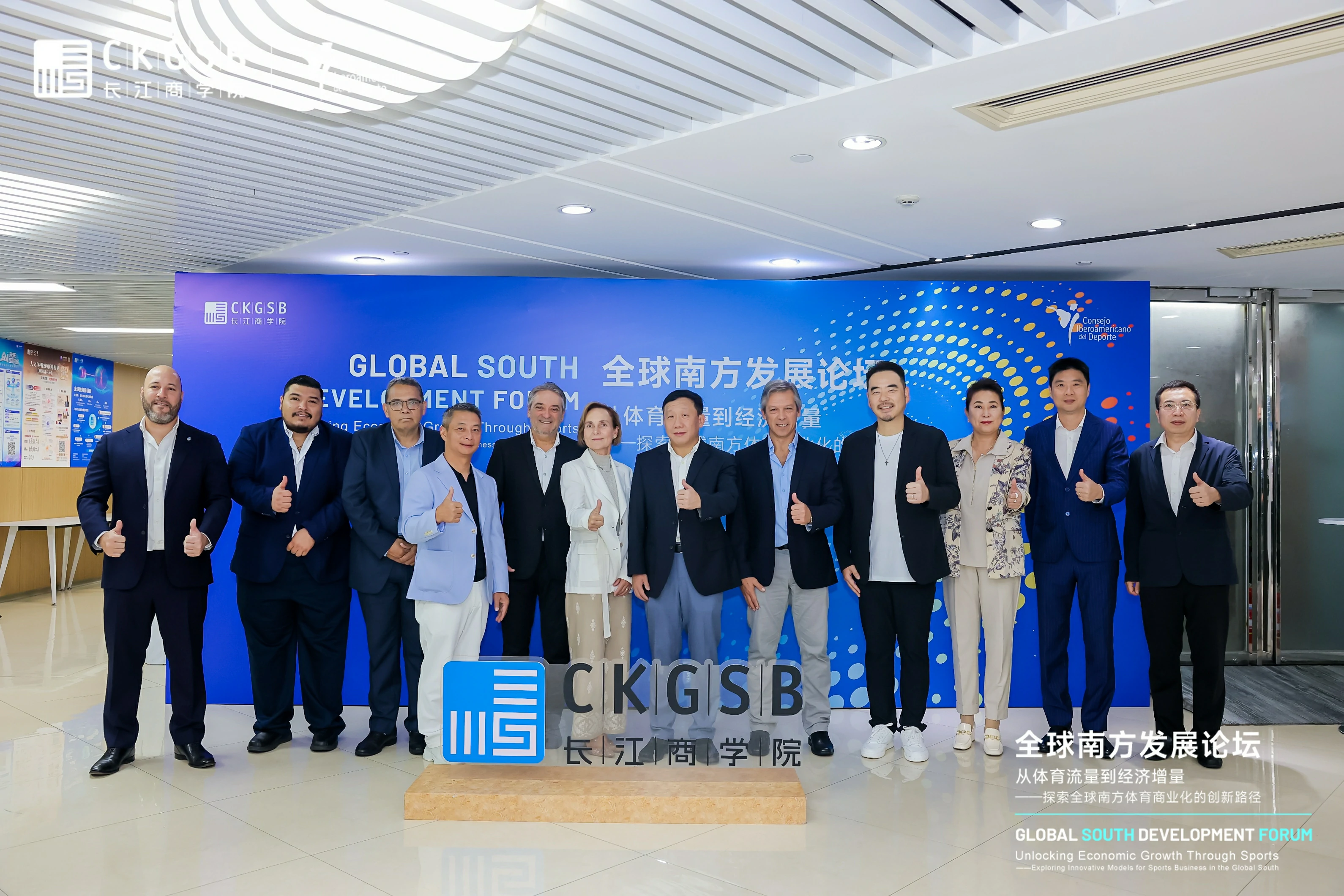July 29, 2025 | Beijing – The “Global South Development Forum – From Sports Traffic to Economic Growth,” co-hosted by Cheung Kong Graduate School of Business (CKGSB) and the Ibero-American Sports Council, was successfully held on July 29, 2025, at CKGSB’s Beijing campus.
This high-level forum, the first of its kind by a Chinese educational institution focusing on the sports economy in the Global South, underscored the growing global momentum toward enhanced cooperation and shared development among emerging nations.
The event brought together senior sports officials from Brazil, Spain, Argentina, Uruguay, Nicaragua, and other Ibero-American countries, alongside leaders from China’s business, sports, and philanthropic sectors, to explore how the sports industry can serve as a catalyst for economic growth in the Global South—transforming sports “traffic” into economic and social “value.”
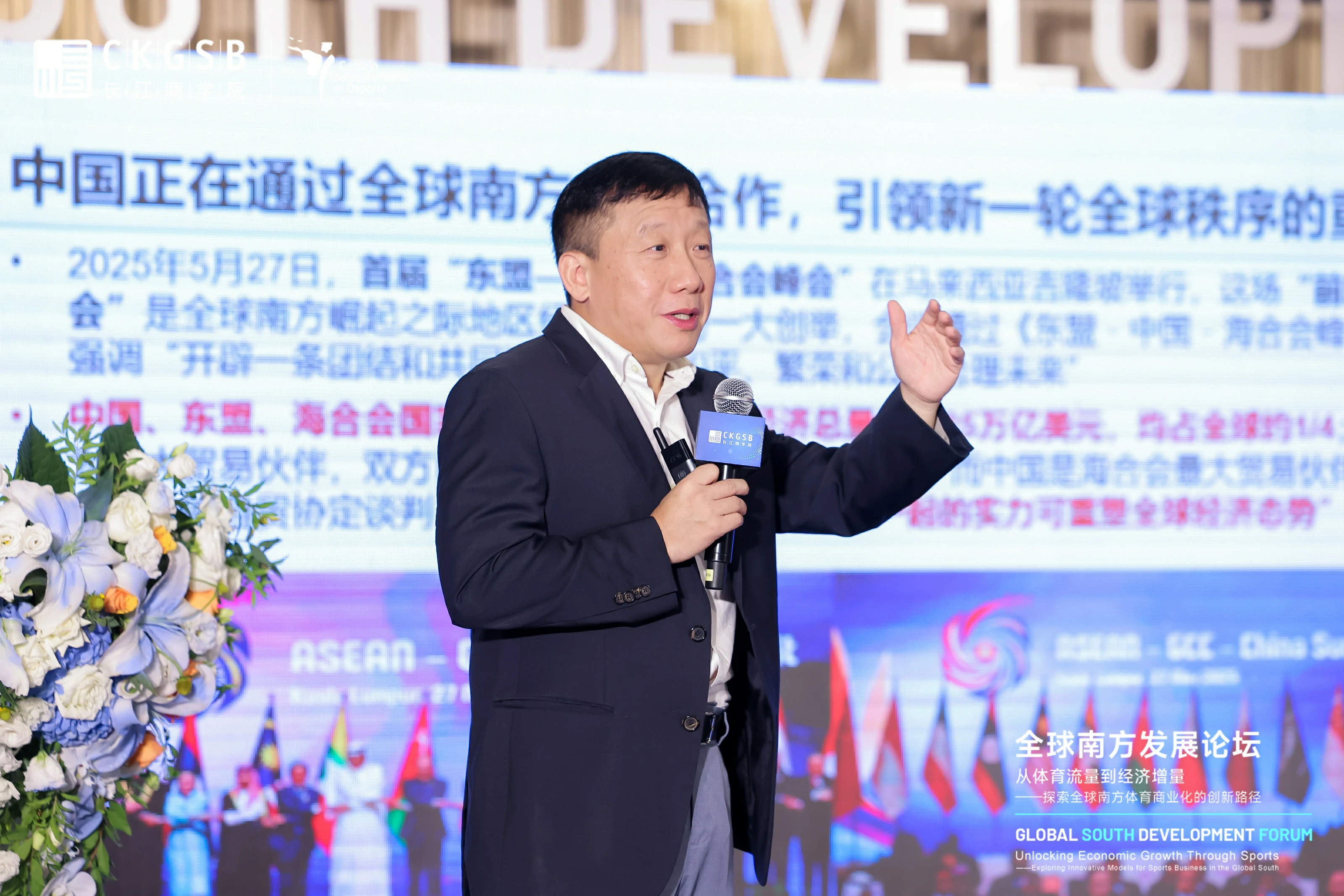
The Global South Reshaping the World Economy
Sports Economy Unlocks New Business Opportunities
As the Global South takes on a more pivotal role in reshaping the global economic landscape, the forum provided a timely and dynamic platform to explore how sports—as a business, a cultural force, and a bridge across borders—can unlock new growth opportunities across emerging markets.
Professor Li Haitao, Dean and Dean’s Distinguished Chair Professor of Finance at CKGSB, delivered a keynote speech highlighting how the Global South—which is home to two-thirds of the world’s population and represents nearly 50% of global GDP—is restructuring the world economic order. He noted that 2025 marks a pivotal turning point in the global economic system due to shifts in trade structures, technological innovation, and the rise of the private sector. The Global South has become a new growth pole in the global economy.
As a hub of trade and investment for these regions, China is actively leading a new wave of industrial integration and global cooperation through innovation and multilateral partnerships. In 2024, China recorded a $1 trillion trade surplus, the highest in its history. The fastest-growing export markets were in the Global South, particularly Brazil, Vietnam, and Indonesia. Notably, China’s exports to these regions are evolving beyond traditional goods—such as clothing, furniture, and appliances—toward higher-value products including digital equipment and new energy vehicles, signaling a significant industrial upgrade.
Dean Li highlighted the strong complementarity between China and Global South countries: China offers world-class capabilities in manufacturing, digital services, and AI innovation, while many Global South nations provide rich natural resources, early-stage industrial products, and vast consumer markets. Together, they form a strong foundation for mutually beneficial collaboration.
He urged Chinese enterprises to build vertically and horizontally integrated global value chains and called for CKGSB to continue fostering a cross-border learning platform that helps entrepreneurs seize the historic opportunity of the “Next China” being found in the Global South.
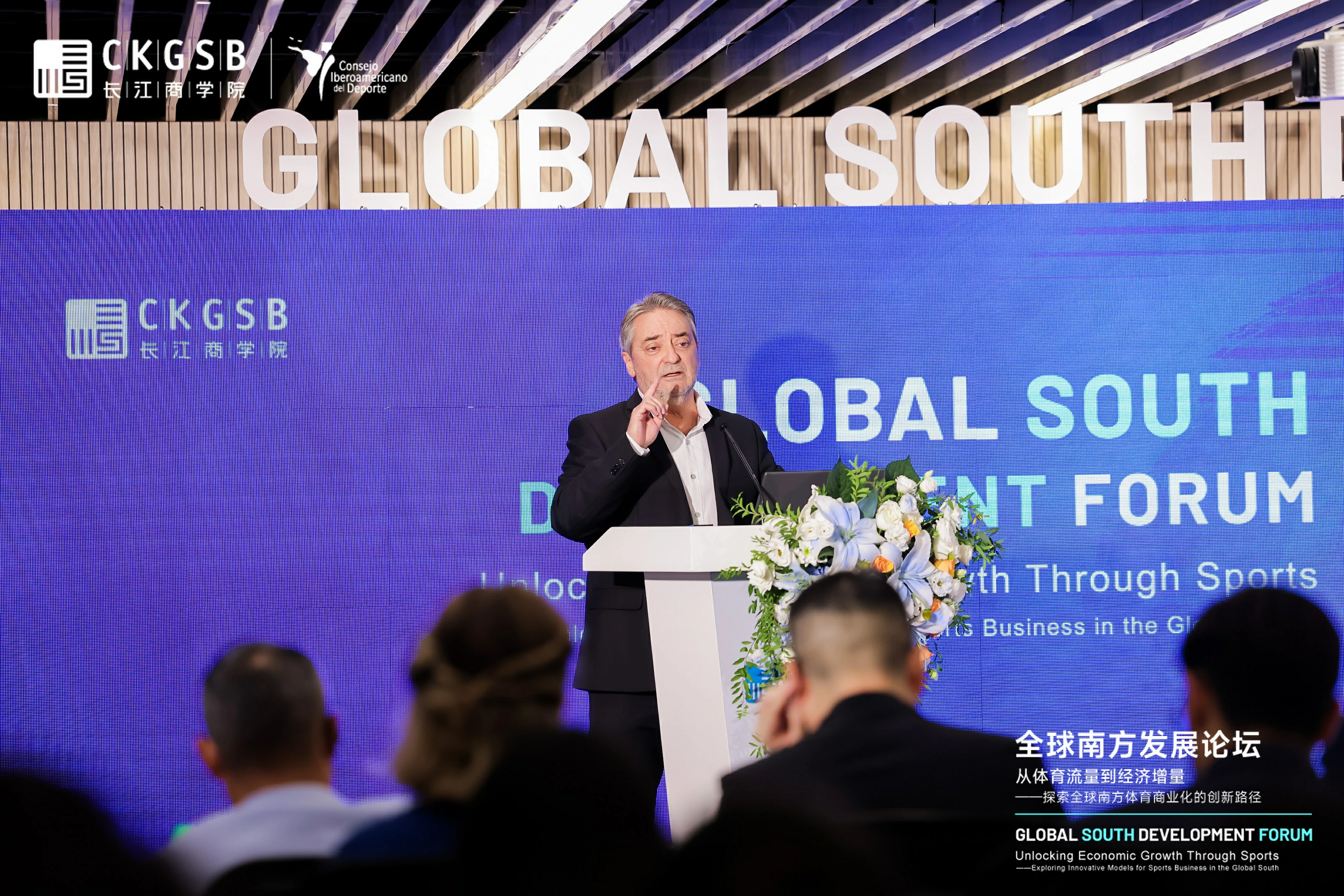
Fernando Cáceres, Honorary President of the Ibero-American Sports Council and former National Secretary of Sports of Uruguay, shared Latin America’s journey in sports commercialization and outlined the prospects for China–Latin America collaboration.
He contextualized his remarks within the broader global sports economy, which is now valued at approximately $800 billion, accounting for 1% of global GDP. However, he pointed out the stark imbalance in regional investment: Europe invests around $240 billion annually, North America several hundred billion, while Asia lags behind with only several billion. Within Ibero-America, Spain and Portugal account for 40% of the region’s total sports investment, while the more than 20 Latin American countries collectively share the remaining 60%—underscoring the need for greater equity and support across emerging markets.
Cáceres praised China’s substantial investment and progressive policies in sports, which reflect not only economic priorities but also cultural values, national unity, and social development. He expressed optimism about future cooperation in areas such as talent development, international event hosting, and Chinese companies investing in overseas sports markets. As collaboration deepens, he noted, mutual understanding between nations will grow—laying the groundwork for broader global partnerships.
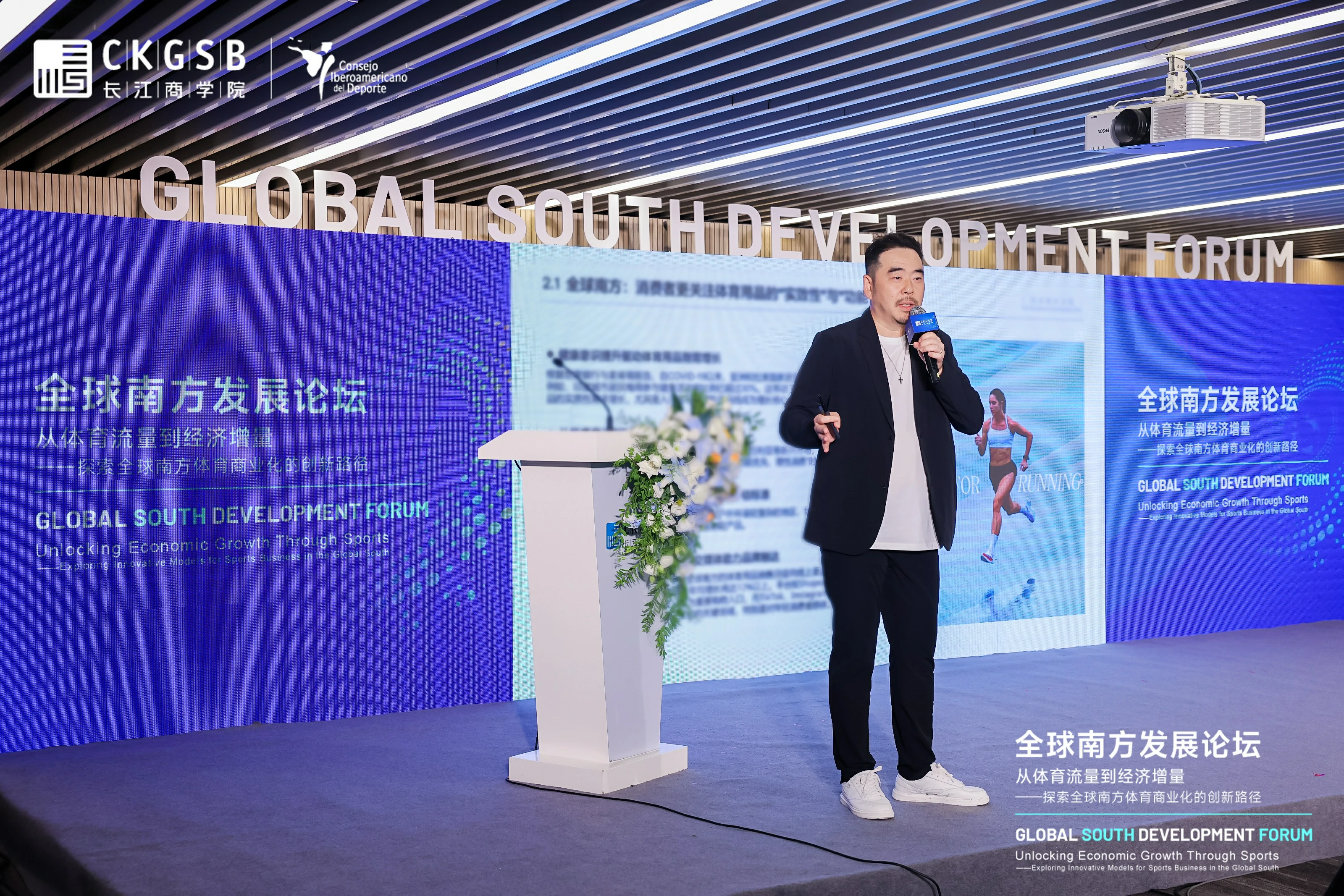
Li Xuanzhi, CEO of Misto Hong Kong Lmited and CEO of Misto Global Sourcing Center (Misto Holdings rebranded from Fila Holdings in April 2025), gave a talk addressing the importance of localizing the company’s globalization strategy, in order to meet the differing needs of consumers. Li, who’s also a CKGSB DBA alumnus, explained that consumers in the Global South, particularly India, Africa, and Latin America, prioritize durability and functionality in sportswear. As e-commerce rapidly expands in these regions, consumers increasingly prefer to purchase sports products online.
He concluded that brand success in these markets depends less on “who the brand is for” and more on “what the brand delivers.” Only brands that deliver on their performance promises and build emotional connections with consumers will achieve long-term success.
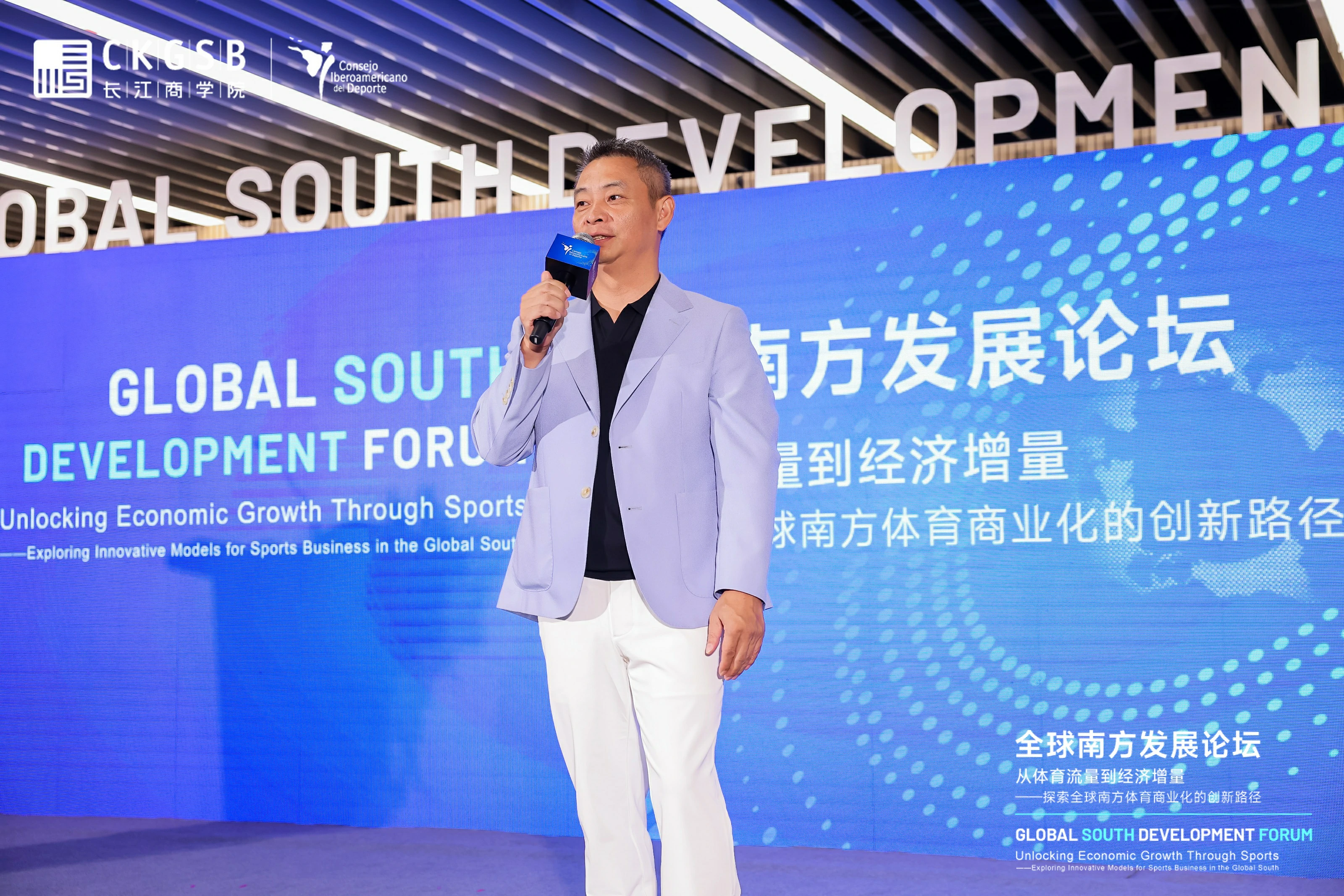
From Elite Athletics to Mass Sports
Exploring Business-Driven Models for Sports Philanthropy
Sports—especially mass sports—have a natural synergy with philanthropy. As a symbol of a healthy lifestyle and a vehicle for social cohesion, sports can play a vital role in fostering equity and development. The forum’s speakers shared how philanthropy and business can be aligned for sustainable social impact.
Olympic champion Li Xiaoshuang, who’s also the founder of Hubei Haowu Shuangxing Technology and a CKGSB EMBA alumnus, spoke on “The Integration of Competitive and Mass Sports in China.” He reflected on China’s four-decade rise in elite sports and noted that mass sports are now entering a critical growth phase.
He emphasized that the essence of sports is “physical cultivation,” and it should be woven into daily life—from homes to schools to communities. He called for a “dual-track” approach: the government should enhance physical education and infrastructure, while the market should expand product offerings to meet the diverse needs of China’s 1.4 billion people. “Elite sports are the torch; mass sports are the flame,” he said. A truly strong sports nation will emerge when GDP from sports grows and fitness becomes a lifestyle.
Li Tian, founder of the “Dream Chasers” youth football initiative and a CKGSB EMBA alumnus, delivered a speech in which he presented a new model for business-aligned sports philanthropy that can garner billions of views. Using his 2024 youth football partnership with Guizhou’s grassroots “Village Super League,” in which he engaged Oppo’s spokesperson and globally-renowned soccer player Kaka, as a case study, he proposed a “Goodwill Triangle” model:
Li emphasized that business-driven philanthropy must align brand DNA with social initiatives, fostering symbiotic relationships. “Doing good through business means using commercial intelligence to amplify goodwill,” he said. “True business success comes from deep emotional investment in society.”
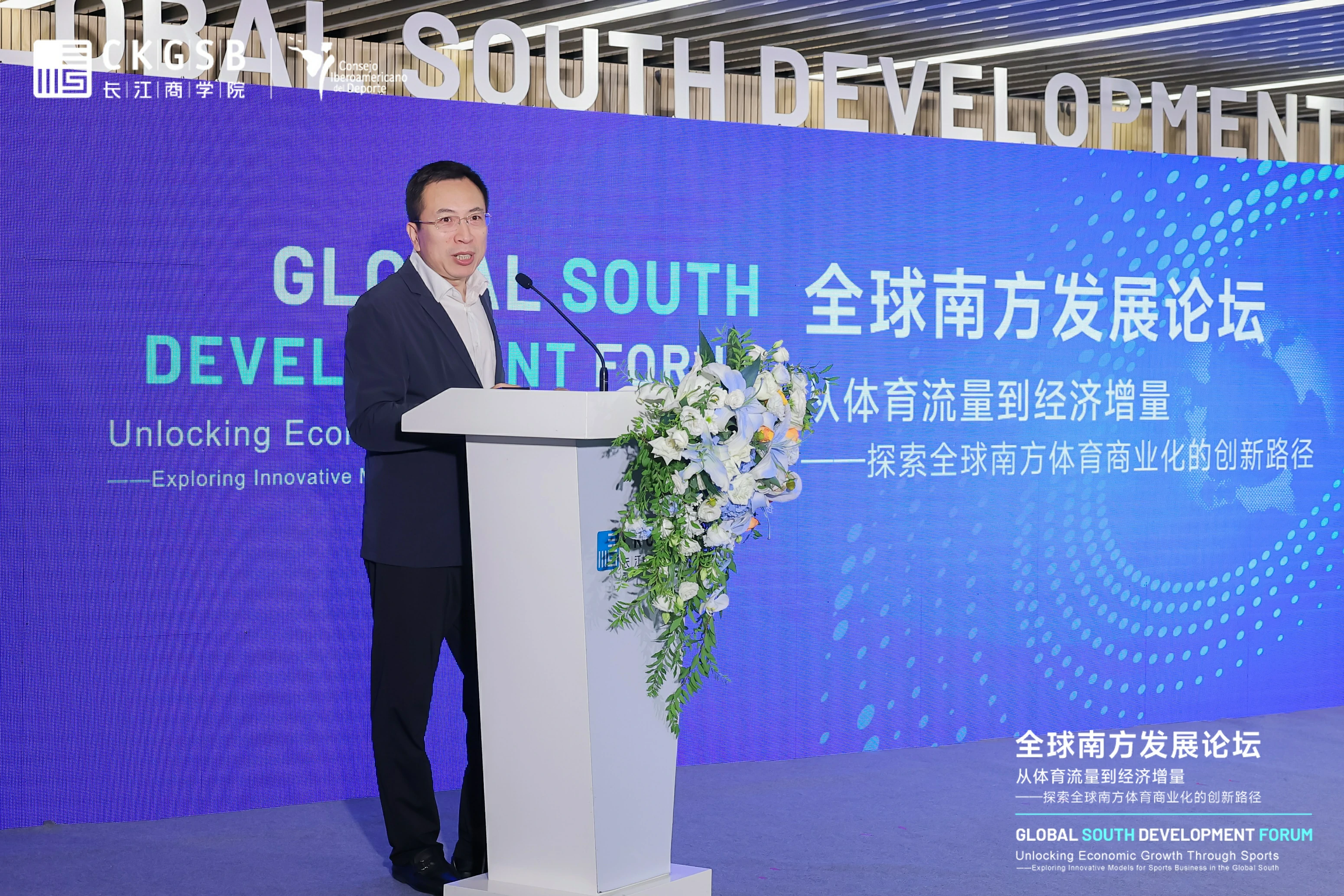
Zhang Da, Secretary-General of the China Guanghua Science & Technology Foundation, also emphasized the “Sustainable Loop Between Public Welfare and Business.” He argued that philanthropy—often considered the “third distribution” of wealth—can fuel business growth through shared value creation. Zhang called on businesses and NGOs to co-create deep, innovative ecosystems where social responsibility becomes a driver of sustainable growth. “Philanthropy isn’t a one-way act,” he concluded. “It’s a pivot point for mutual value creation.”
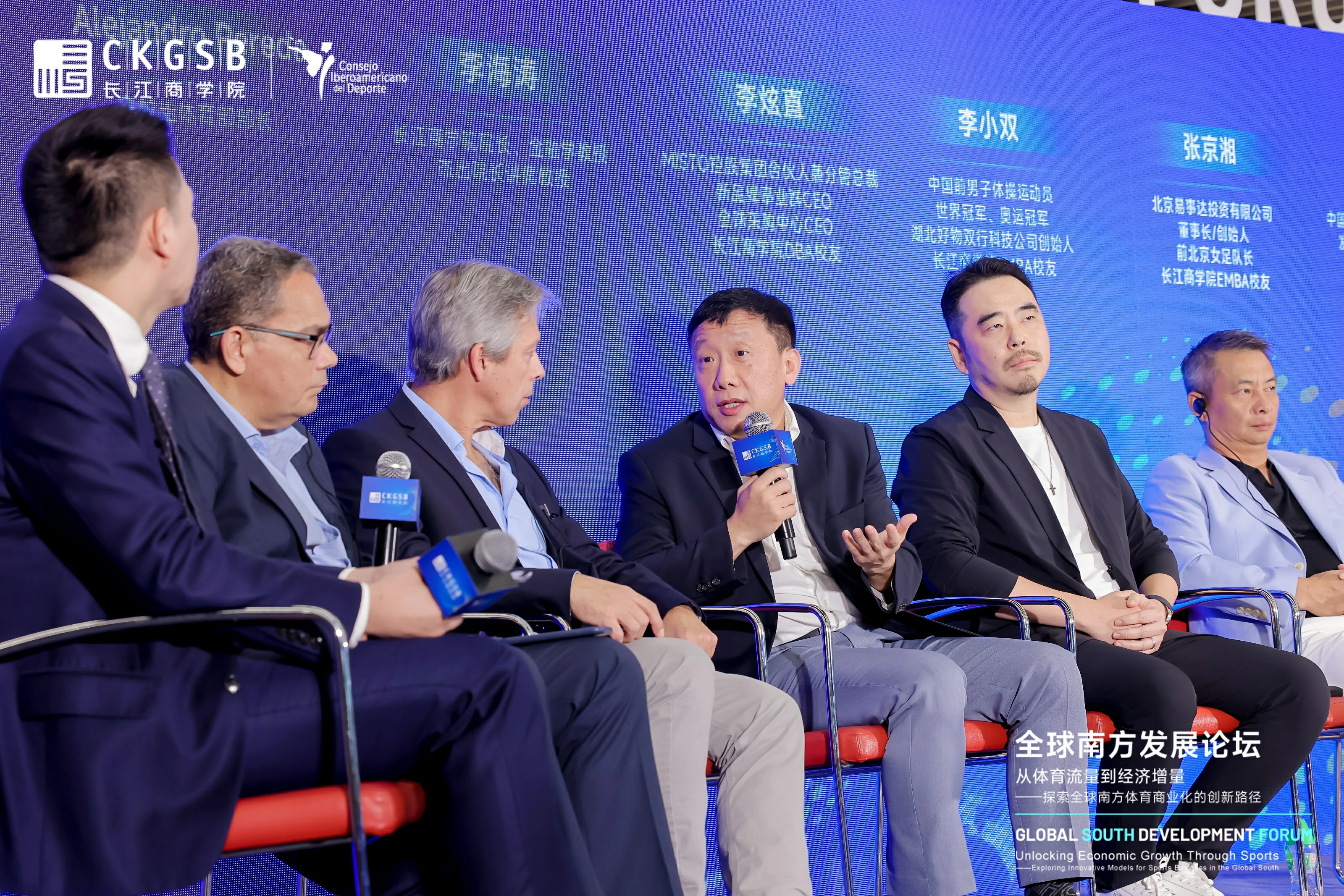
Mutual Benefits and Complementary Strengths
Expanding Horizons for China–Latin America Sports Cooperation
As China and Latin American countries deepen ties in trade, diplomacy, and cultural exchange, sports have emerged as a vital bridge for grassroots dialogue, economic growth, and cross-sector innovation. In a roundtable moderated by renowned TV host Wang Guan, seven speakers discussed in the forum’s final panel on how to maximize complementary strengths in sports commercialization and unlock new opportunities in Global South collaboration.
Dean Li Haitao highlighted the shared interests and complementary advantages among Global South nations. He proposed using the sports economy as a launchpad for broader cooperation in branding, products, and services—creating a shared future through South–South collaboration.
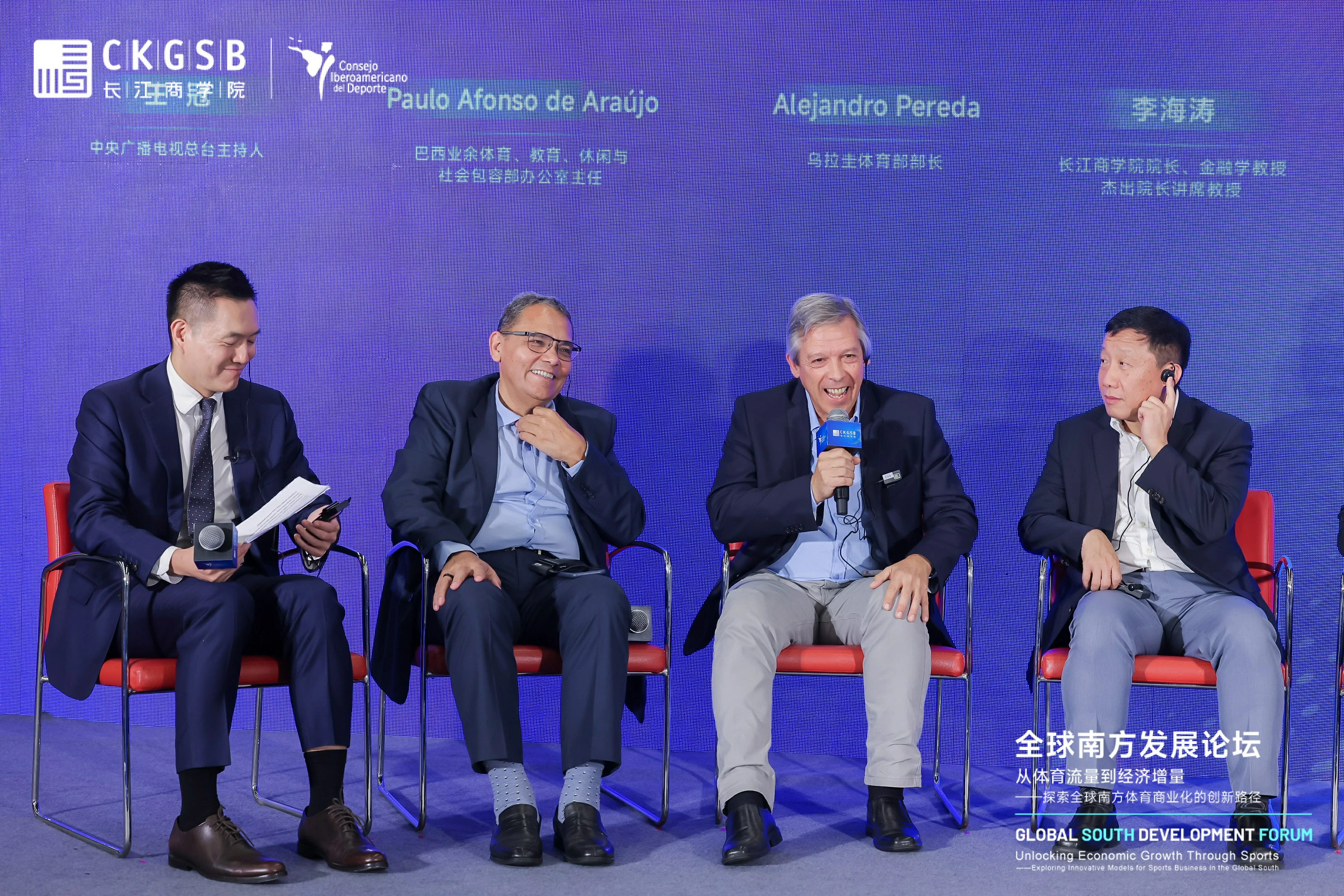
Paulo Afonso de Araújo, Director of Brazil’s Department of Amateur Sports, Education, Leisure and Social Inclusion, noted that Brazil and China are well-positioned to collaborate, especially in youth football development. He also encouraged leveraging BRICS as a platform to develop more inclusive global sports cultures.
Zhang Jingxiang, Chairwoman of Beijing YSD Capital and former captain of the Beijing Women’s Football Team, emphasized the power of women’s sports to inspire and mobilize communities. She observed that sports events led by women often drive family participation and local spending. Zhang advocated a balanced approach to commercialization: prioritize long-term female development while monetization follows—“growth first, profits later.”
Alejandro Pereda, Uruguay Secretary of State for Sports, shared Uruguay’s success in making football a cultural cornerstone, with 4 in 10 children playing the sport. He underscored that sports cooperation should go beyond economics to focus on societal progress, with impact felt at both the community and grassroots levels.
Li Xiaoshuang reiterated the need to revitalize China’s “three major ball games” (football, basketball, volleyball) by systematically integrating sports from kindergarten to university, making sports a routine part of school life.
Li Xuanzhi cited South Korea’s complete sports ecosystem as a model—offering structured programs from early childhood through university. He also noted that global brands must remain culturally adaptable while executing unified global strategies.
Li Tian shared that through years of rural football philanthropy, he’s seen the determination of underprivileged children to change their destinies through sports. His goal is to turn the Dream Chasers project into a self-sustaining philanthropic brand powered by corporate partnerships.
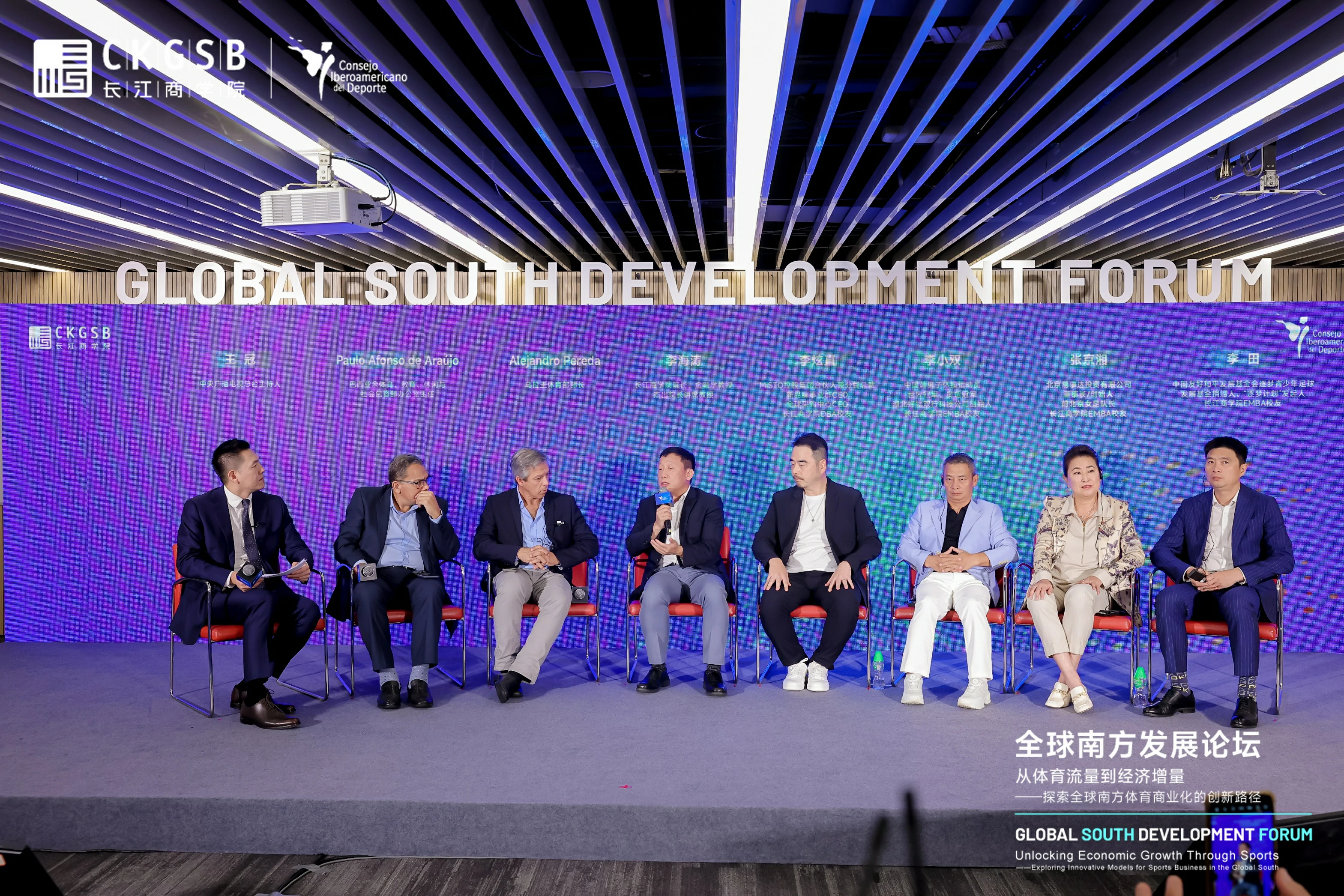
The Ibero-American Sports Council brought a robust delegation to the forum, including María Belén Martínez (Director of International Relations at Spain’s National Sports Council), Daniel Pérez Sequeira (Co-President of Nicaragua’s Sports Association), and Philippe Alexandre Oudinot (Deputy Director at Argentina’s Ministry of Sports), among others.
CKGSB remains committed to fostering collaboration and innovation across the Global South, with forums like this one serving as a platform for China and Latin America to connect, share and contribute to economic development through sports.
